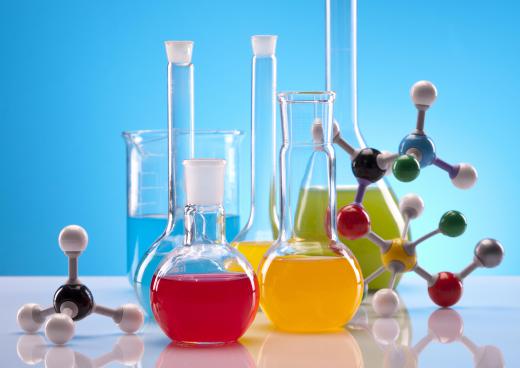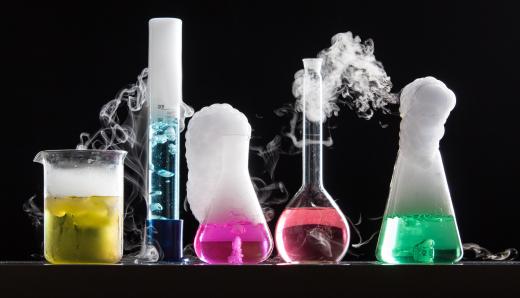What is Inorganic Chemistry?
Inorganic chemistry is a branch of chemistry that deals with the properties and behavior of inorganic compounds. Inorganic compounds are generally those that are not biological, and characterized by not containing any hydrogen and carbon bonds. It is almost easier to discuss this field in terms of what it is not — organic chemistry. Organic chemistry is the study of any chemical reaction that involves carbon, which is the element that all life is based on.
The term "organic" has traditionally referred only to animal or plant matter, so there is a common misconception that organic chemistry always refers to life processes, or that inorganic chemistry applies to everything that does not. This assumption is inaccurate. Many chemical processes veer away from this line of thinking, and there are many chemical life processes that depend on inorganic chemical processes.

There are exceptions to every rule. Although carbon is the main common element in organic chemistry, inorganic chemical compounds can contain carbon, too. For example, carbon monoxide and carbon dioxide both contain carbon, but are inorganic compounds. Carbon dioxide, in particular, is also very important to chemical processes necessary for life, especially plant life. The truth is that the lines between inorganic and organic chemistry are often blurred.

There are many branches of inorganic chemistry available for specialization. Geochemistry is the study of the chemicals of the Earth and other planets, and it covers the chemical compositions of rocks and soil. Within the field of geochemistry, there are several subfields, including isotope geochemistry, cosmochemistry and biogeochemistry.
Another branch is physical chemistry, which relates to the concept of physics in chemical systems. This field is also sometimes called physicochemistry. It uses the principles of thermodynamics, quantum chemistry, and kinetics as its basis.

On the other hand, bioinorganic chemistry is the study of compounds containing metal-carbon bonds within biological systems. This is a particularly interesting branch because it also incorporates aspects of organic chemistry into it. Bioinorganic chemistry focuses on the pretense of metal ions in biochemical processes.
Inorganic chemistry lends itself to many different industries, including education, environmental science, and government agencies. A scientist who focuses on this field might create or improve formulas for household cleansers. He may also work in chemical research, coming up with new ways to manipulate the properties of metallic elements into useful functions.
AS FEATURED ON:
AS FEATURED ON:













Discussion Comments
Why do we group one type of compound -organic compound- by itself and group everything else as inorganic chemistry?
There are so many elements and compounds. I don't understand why elements with carbon are studied separately, when all else is sort of dumped together under one title- inorganic chemistry. The article also mentions that inorganic compounds also have carbon.
I think that chemists have prioritized organic chemistry. But inorganic chemistry is just as significant and essential.
Post your comments